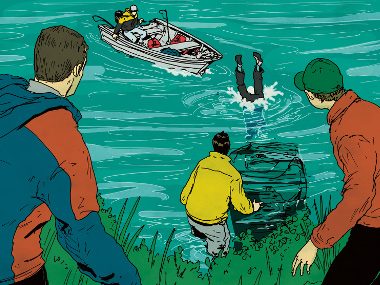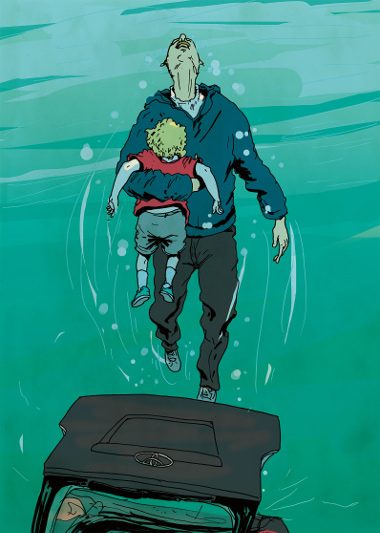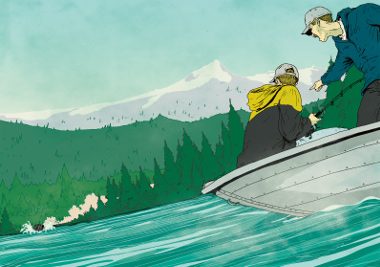Trapped Underwater: How a Group of Strangers Saved a Boy’s Life
As he released the car’s back hatch, John glimpsed an image he’ll never forget: the boy’s blond hair waving, his limp arms suspended overhead.

Last August, John and Mark Chapman were relishing one of the final days of their fishing trip when the morning stillness was shattered by the sound of a vehicle speeding on a gravel road. Whiteswan Lake is a remote, glacier-fed jewel set in British Columbia’s Kootenay Ranges, and while it wasn’t unusual to spot a car at 10:30 a.m., this one roared over the steady hum of the Chapmans’ outboard motor. Across the lake, 800 metres away, the black hatchback Toyota Matrix trailed a plume of dust.
In the bow of the aluminum boat, John dropped his rod and fired a wide-eyed glance at his brother. “Jeez, that car is going fast.” There are no guardrails where Whiteswan Forest Service Road passes beneath a line of cliffs on the lake’s south shore; the curving roadbed is separated from the water by a metre-high, shrubbery-spotted embankment. John heard the splash before he could swing his head back toward the road. The car had disappeared.
Without a second thought, Mark cut his fishing line and gunned the four-horsepower engine. The eight-minute ride across the lake felt interminable. When the brothers reached the crash site, Mark, 51, a public-works operator in Turner Valley, Alta., switched off the motor and let the boat drift into a scene of chaos: a handful of drivers who had come across the accident were swimming frantically to the submerged car, clearly visible in four metres of emerald-clear water, five metres offshore.
Michelle Dauphin* stood soaked on the embankment; her 16-year-old daughter, Lisa, sat beside her, in shock. “Save my boy!” Michelle screamed. Rowan, her five-year-old, was still inside the car. That’s all it took for John, a 53-year-old truck driver from Lethbridge, Alta., to launch into the water, fully clothed.
It was a fluke that the Chapman brothers were fishing on Whiteswan Lake at all. They’d planned a week-long vacation at Whitetail Lake, a sliver of water in southeastern B.C.’s Purcell Mountains that Mark had visited before. Then their brother-in-law suggested Whiteswan. Mark liked the idea of going someplace new, so the Chapmans left for the Kootenays. “We shouldn’t have been there,” reflects Mark. “But something was guiding us.”
Whiteswan Lake was an estimated 15 degrees Celsius that day-cold enough to make John gasp the instant he made contact. He treaded water above the sunken car, took a deep breath and dived. The vehicle was resting vertically, propped up by a large boulder. It was all banged up, John remembers, perhaps from hitting the water. Three of the windows were open, which meant escape for Michelle and Lisa was likely rapid. But damage to the front doors sustained on impact might have caused the interior to flood, leaving the two women with scant time to release Rowan from his car seat in the back. Engine weight would then have caused the car, swamped with water, to nosedive to the bottom.
John resurfaced for air. By now Mark had manoeuvred the boat and was tossing life jackets to a few bystanders floundering in the lake. John went under again and discovered the car doors were jammed shut. He then decided to try the back hatch. He had been underwater for scarcely a minute but already felt depleted-another reminder that a lifetime of smoking was catching up to him. Camping gear floated out of the trunk as John released the hatch and struggled to remove non-buoyant items. Then, with his eyes burning from the cold water, he glimpsed an image he’ll never forget: Rowan’s blond hair, waving in the water, his limp arms suspended overhead. Time was ticking. The car had been underwater for over 10 minutes. Clearly Mark wasn’t going to extract Rowan alone. That’s when a Korean man, who spoke no English, appeared in the water beside him. “He was in his underwear,” recalls Mark. “No one else had the wherewithal to strip down.” With hand gestures, Mark communicated a strategy. “I wanted him to hold me down in the water by my feet,” he says. “When I kicked, that meant let me up, I need air.” In deep water, this required both men to dive simultaneously.
Time was ticking. The car had been underwater for over 10 minutes. Clearly Mark wasn’t going to extract Rowan alone. That’s when a Korean man, who spoke no English, appeared in the water beside him. “He was in his underwear,” recalls Mark. “No one else had the wherewithal to strip down.” With hand gestures, Mark communicated a strategy. “I wanted him to hold me down in the water by my feet,” he says. “When I kicked, that meant let me up, I need air.” In deep water, this required both men to dive simultaneously.
It felt surreal to be held underwater, but it gave Mark the dexterity he needed to free Rowan from the car seat. On the second attempt, “it happened in a flash,” says Mark. “I pulled him out and got his head above the surface. In the back of my mind, I knew it was too late; he’d been in the water way too long.”
At his home in the picturesque resort town of Fairmont Hot Springs, B.C., Andi Dzilums saw little need for an early start. His brother, Paul, and Paul’s then-girlfriend, Alison Miller, were visiting from Calgary. Andi, a 32-year-old naturalist and adventure guide, planned to take his guests on a leisurely hike at Ptarmigan Lake, amid the rock-bound alpine peaks just north of Whiteswan Lake. Andi’s friend, Kevin Hope, agreed to come at the last minute. “It’s a four-hour hike,” says Andi, who works in the marketing department at Fairmont Hot Springs Resort. “It was going to be an easy day. We were in no rush.”
Around 11 a.m., Andi drove along the shore of Whiteswan Lake and came across what he first thought was a “bear jam”-local-speak for a roadside wildlife encounter that draws camera-toting tourists. Then he saw the black car underwater and people-some soaking and draped in blankets-milling. “I thought, Let’s pull over and see if we can help,” says Andi.
Rowan was lying limp on the gravel road, surrounded by an ashen-faced group. A park employee had made an emergency call by satellite phone; help was on the way, but since it was likely coming from Kimberley, B.C., 63 kilometres away, it wouldn’t arrive any time soon. Michelle was distraught, Andi recalls, and Lisa remained ghostly still. Rowan had been out of the water for 10 minutes. Someone was making a timid attempt to revive him with CPR. “He just looked waterlogged,” Andi says. The Chapmans boated back to the campground on Whiteswan Lake, stopping to collect the scattered remnants of the accident floating in the water: groceries, plastic tote boxes and camping gear. The gravity of the situation hit home when Mark lifted a stuffed dog out of the water. Days later, when he told his six-year-old daughter, Aurora, about finding Rowan’s toy, she disappeared into her room. “Here, Daddy,” she smiled, handing Mark a stuffed animal of her own. “When you see that boy again, give him this.”
The Chapmans boated back to the campground on Whiteswan Lake, stopping to collect the scattered remnants of the accident floating in the water: groceries, plastic tote boxes and camping gear. The gravity of the situation hit home when Mark lifted a stuffed dog out of the water. Days later, when he told his six-year-old daughter, Aurora, about finding Rowan’s toy, she disappeared into her room. “Here, Daddy,” she smiled, handing Mark a stuffed animal of her own. “When you see that boy again, give him this.”
A week later, John received a call from the RCMP: Rowan had recovered completely from his drowning. John told his brother right away. “At first I didn’t believe him,” says Mark, who had taken a month off of work to recover. “I kept telling myself, If I could only have got there faster, held my breath longer. It’s not like the movies. You can be told you’re a good guy, that you’re a hero, but you don’t feel it. I beat myself up for awhile.”
Last December, a few days before Andi’s wife, Jocelyn MacGregor, gave birth to Hawkly, their first baby, he received his own surprise phone call. It was Michelle Dauphin, wondering if he’d like to speak with her son. “I thought he’d been underwater for too long. There was no way he would recover,” says Andi. Cases of non-responsive drowning victims surviving after 20 minutes of CPR are extremely rare. “Now we were talking.”
How to Escape a Sinking Car
In 2005, a team led by University of Manitoba thermophysiology professor Gordon Giesbrecht launched a comprehensive study of vehicle submersion deaths, which account for up to 10 per cent of all drownings. Giesbrecht discovered that as long as the windows are closed and the passenger compartment remains intact, a vehicle will float for up to three minutes. Within this floating period, occupants can escape.
– RELEASE YOUR SEAT BELT. To move quickly, you need to be unrestrained.
– Open or break at least one window. Electronic windows should work as long as the car is floating. It’s difficult to break a window without a special tool, so consider stowing a small hammer under your seat.
– Unbuckle younger passengers.
– Have everyone escape from the closest open window, pushing out kids first.



